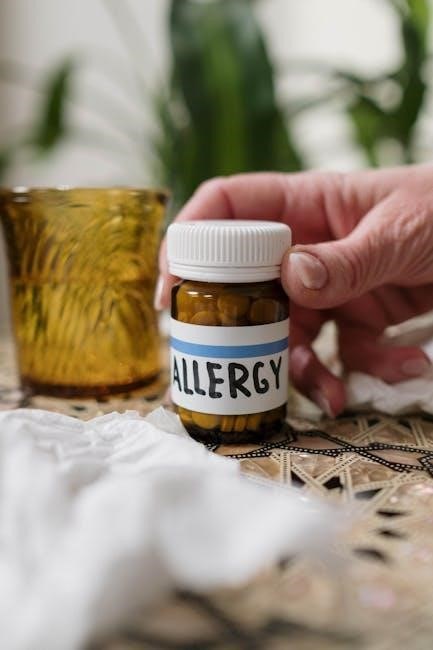Home remedies offer natural, cost-effective solutions for common ailments, promoting holistic well-being with minimal side effects, empowering individuals to take charge of their health safely and effectively.
1.1 What Are Home Remedies?
Home remedies are natural, non-invasive treatments using readily available ingredients like herbs, spices, and household items to address common ailments. These methods, often passed down through generations, are safe, cost-effective, and gentle, promoting wellness without harsh chemicals or side effects.
1.2 Importance of Natural Healing
Natural healing emphasizes the body’s innate ability to recover through holistic approaches, promoting overall wellness without harsh chemicals. It empowers individuals to take control of their health, offering cost-effective, gentle, and sustainable solutions that address the root cause of ailments, fostering long-term well-being and resilience.
1.3 Safety and Effectiveness of Home Remedies
Home remedies are generally safe and effective for mild to moderate illnesses, providing natural solutions with fewer side effects. They empower individuals to manage common ailments like nausea and fever at home. However, their efficacy can vary depending on the condition and individual response. While they offer a cost-effective alternative to conventional medicine, they may not be suitable for severe or chronic diseases. It’s important to use these remedies responsibly and seek professional medical advice when symptoms persist or worsen.

Common Diseases and Their Home Remedies
Home remedies effectively address common ailments like nausea, fever, and whooping cough using natural ingredients and lifestyle adjustments, offering relief and promoting recovery without severe side effects.
2.1 Nausea and Vomiting
Nausea and vomiting can be alleviated with ginger, lemon, or peppermint remedies. Staying hydrated and eating bland foods helps. Seek medical attention if symptoms persist or worsen, especially in children, to prevent dehydration and ensure proper care.
2.2 Fever in Adults and Children
Home remedies for fever include staying hydrated with fluids, using cool compresses, and ensuring adequate rest. Monitor temperature closely and seek medical advice if fever exceeds 103°F (39.4°C) or is accompanied by severe symptoms like dehydration or difficulty breathing.
2.3 Whooping Cough (Pertussis)
Whooping cough, caused by Bordetella pertussis, is highly contagious and marked by severe coughing spells. Home remedies include staying hydrated, using honey to soothe the throat, and creating a steamy environment for easier breathing. Consult a healthcare provider if symptoms worsen or for infants under 6 months.
2.4 Mild Illnesses in Children
Mild illnesses in children, such as coughs, fever, or upset stomachs, can often be managed at home. Remedies include honey for coughs, warm fluids for hydration, and rest. Monitor symptoms closely and consult a doctor if they persist or worsen, especially in young children or those with weakened immunity.
2.5 Allergic Reactions and Anaphylaxis
Allergic reactions can range from mild symptoms like rashes or itching to severe anaphylaxis, a life-threatening condition. Immediate home remedies include administering epinephrine if available, staying calm, and seeking urgent medical care. For mild reactions, cold compresses or antihistamines may help alleviate symptoms temporarily.

Natural Remedies for Respiratory Issues
Natural remedies like steam inhalation, herbal teas, and honey can alleviate respiratory discomfort. These methods promote relaxation and aid in clearing airways, offering soothing relief for coughs and congestion naturally.
3.1 Cough and Cold Remedies
Home remedies for coughs and colds include honey to soothe sore throats, steam inhalation to clear congestion, and warm teas to reduce irritation. Staying hydrated and using natural expectorants like ginger help alleviate symptoms effectively, offering comfort and promoting recovery without harsh side effects.
3.2 Bronchitis and Lung Infections
Natural remedies for bronchitis and lung infections include turmeric, ginger, and eucalyptus oil to reduce inflammation and congestion. Staying hydrated and consuming a warm, balanced diet can aid recovery. Saltwater gargles and steam inhalation also help soothe symptoms and promote healing in the respiratory system effectively.
3.4 Asthma and Breathing Difficulties
Natural remedies like ginger, turmeric, and honey can help soothe asthma symptoms and reduce inflammation. Staying hydrated, avoiding triggers, and practicing deep breathing exercises are also effective. Essential oils such as eucalyptus can ease congestion, while maintaining a clean environment reduces allergens and improves breathing conditions naturally.
Dietary and Lifestyle Adjustments
A balanced diet rich in vitamins, hydration, and adequate rest supports recovery and overall health, helping the body heal naturally and maintain resilience against common ailments effectively.
4.1 Nutrition for Recovery
Nutrition plays a vital role in recovery, with protein, vitamins, and minerals aiding healing. Hydration and balanced diets rich in fruits, vegetables, and whole grains support immune function and overall well-being, helping the body recover naturally and effectively from common illnesses and infections.
4.2 Hydration and Fluid Intake
Hydration is essential for recovery, as water aids digestion, maintains body temperature, and supports skin health. Drinking 8-10 glasses of fluid daily, including water, herbal teas, and clear broths, helps prevent dehydration and supports overall well-being during illness and healing.
4.3 Rest and Sleep for Healing
Rest and sleep are crucial for recovery, as they allow the body to repair itself. Aim for 7-9 hours of quality sleep daily and incorporate naps if needed. A calm environment and consistent sleep schedule can enhance healing, supporting immune function and overall well-being.

Herbal and Ayurvedic Remedies
Herbal remedies like turmeric and ginger are known for their anti-inflammatory properties. Ayurveda uses natural plants to boost immunity and treat ailments, promoting holistic health effectively.
5.1 Herbs for Immunity Boosting
Herbal remedies such as echinacea, elderberry, and garlic are renowned for their immune-boosting properties. Echinacea strengthens the body’s defense system, while elderberry fights viral infections. Garlic’s antimicrobial effects help prevent illnesses, making these herbs excellent natural solutions for enhancing immunity and overall health.
5.2 Ayurvedic Practices for Common Ailments
Ayurveda offers tailored remedies for common ailments using natural herbs and practices. Techniques like Panchakarma detoxify the body, while herbs such as turmeric and ginger reduce inflammation; These practices promote holistic healing, balancing the body’s energies to treat illnesses naturally and prevent future health issues effectively.
5.3 Essential Oils for Health
Essential oils are potent plant extracts used for their therapeutic benefits. Oils like lavender and eucalyptus can alleviate stress, improve sleep, and reduce inflammation. Used through diffusion or topical application, they offer natural relief for various health issues, promoting well-being without harsh chemicals.
When to Seek Medical Help
Recognizing severe symptoms, such as difficulty breathing or chest pain, requires immediate medical attention. Seek help for persistent or worsening conditions to prevent complications.
6.1 Recognizing Severe Symptoms
Severe symptoms like difficulty breathing, chest pain, or high fever require immediate medical attention. Persistent vomiting, dehydration, or severe allergic reactions (anaphylaxis) also necessitate urgent care. Delaying medical help can lead to serious complications or worsening of the condition, emphasizing the importance of timely intervention.
6.2 Emergency Situations
Emergency situations, such as severe allergic reactions (anaphylaxis), difficulty breathing, or chest pain, require immediate medical intervention. Home remedies are insufficient in these cases, and professional help must be sought without delay to prevent life-threatening complications or long-term damage.
6.3 Preventing Complications
Preventing complications involves early detection of severe symptoms, maintaining good hygiene, and ensuring timely medical intervention. Vaccinations, proper nutrition, and monitoring illnesses can help avoid worsening conditions. Knowing when to seek professional help is crucial to prevent long-term health issues and ensure effective recovery.
Preventative Measures
Preventative measures include vaccinations, proper hygiene, and maintaining a healthy lifestyle to reduce the risk of common diseases and promote overall well-being effectively.
7.1 Hygiene Practices
Good hygiene practices, such as frequent handwashing, sanitizing surfaces, and avoiding close contact with infected individuals, play a crucial role in preventing the spread of common diseases and maintaining overall health effectively.
7.2 Vaccinations and Immunizations
Vaccinations are a proven method of preventing common diseases, reducing the risk of complications, and boosting immunity. Following recommended schedules ensures protection against infectious diseases, particularly for children and vulnerable populations, promoting long-term health and community well-being effectively.
7.3 Maintaining a Healthy Lifestyle
A healthy lifestyle involves balanced nutrition, regular physical activity, adequate hydration, sufficient sleep, and stress management. These practices strengthen immunity, prevent chronic diseases, and improve overall well-being, ensuring long-term health benefits and reducing the risk of common ailments effectively.

Mental Health and Wellness
Mental health is crucial for overall well-being, involving stress management, anxiety reduction, and cognitive stimulation. Prioritizing emotional balance enhances resilience and improves quality of life effectively.
8.1 Stress Management
Effective stress management involves techniques like deep breathing, meditation, and yoga to calm the mind. Herbal teas, such as chamomile, and time management strategies can also help reduce stress naturally, promoting emotional balance and improving overall mental well-being.
8.2 Anxiety and Depression
Herbal remedies like St. John’s Wort and chamomile tea can help alleviate mild anxiety and depression. Regular physical activity, mindfulness practices, and aromatherapy with essential oils such as lavender also promote emotional well-being and reduce symptoms naturally.
8.3 Cognitive Stimulation and Memory Improvement
Engage in activities like puzzles, reading, and memory games to enhance cognitive function. Social interaction and lifelong learning also boost mental sharpness. Incorporating physical exercise and a balanced diet rich in antioxidants and omega-3 fatty acids supports brain health and improves memory retention naturally.

First Aid and Emergency Care
First aid and emergency care provide immediate, essential steps to prevent worsening of injuries or illnesses. Knowing these techniques empowers individuals to act swiftly and confidently in critical situations.
9.1 Basic First Aid Techniques
Basic first aid techniques involve assessing the situation, cleaning wounds, applying bandages, immobilizing injuries, and controlling bleeding. These methods prioritize immediate care to prevent further harm and promote recovery, ensuring safety until professional medical help is available when needed.
9.2 Managing Injuries and Wounds
Managing injuries involves cleaning wounds with sterile water, applying antibiotic ointments, and covering with bandages. Elevating injured limbs reduces swelling, while natural remedies like aloe vera for burns or turmeric for antiseptic properties can aid healing, minimizing infection risks and promoting tissue repair effectively.
9.3 CPR and Life-Saving Techniques
CPR is crucial in life-threatening situations, such as cardiac arrest. It involves 30 chest compressions followed by two breaths, repeated until medical help arrives. Proper technique ensures blood circulation and oxygen supply to vital organs, significantly improving survival chances and recovery rates.

Common Medications and Dosages
Over-the-counter and prescription medications are essential for treating various ailments. Proper dosage measurement and administration ensure safety and effectiveness. Always consult healthcare professionals for personalized advice and guidance.
10.1 Over-the-Counter Medications
Over-the-counter medications provide accessible, cost-effective relief for common ailments like nausea, fever, and allergies. They are widely available and often the first line of treatment for minor illnesses, ensuring quick symptom management and recovery when used appropriately and as directed by healthcare guidelines.
10.2 Prescription Medications
Prescription medications are stronger, requiring a doctor’s approval, and are used for severe or chronic conditions. They should only be taken under medical supervision to avoid misuse or side effects, ensuring safe and effective treatment tailored to individual health needs and medical conditions.
10.3 Dosage Measurement and Administration
Accurate measurement of medication dosage is crucial for safety and effectiveness. Use measuring cups or syringes for precise administration, especially for children or those with severe conditions. Always follow prescribed instructions to avoid overuse or underuse, ensuring proper treatment and minimizing side effects or complications.
Special Considerations
Home remedies must be tailored for specific groups, such as infants, children, pregnant women, and the elderly, ensuring safety and efficacy for vulnerable populations with unique health needs.
11.1 Remedies for Infants and Children
For infants and children, gentle remedies like warm compresses, herbal teas, and honey (for children over 1) can soothe common ailments. Always ensure remedies are safe and age-appropriate, avoiding harmful substances. Monitor symptoms closely and consult a healthcare professional if severity increases or persists.
11.2 Remedies for Pregnant Women
For pregnant women, safe home remedies include ginger tea for nausea, staying hydrated with herbal teas, and using warm compresses for muscle relief. Always consult a healthcare provider before trying new remedies to ensure safety for both mother and baby.
11.3 Remedies for the Elderly
Elderly individuals can benefit from gentle remedies like hydration-rich drinks, warm baths for joint relief, and turmeric for inflammation. Regular rest and balanced nutrition are also crucial. Always seek medical advice before trying new remedies to ensure they suit specific health conditions and chronic illnesses.
Home remedies provide practical, natural solutions for common ailments, emphasizing prevention and self-care. By adopting these methods, individuals can enhance their well-being and foster a healthier lifestyle effectively.
12.1 Summary of Key Remedies
It seems like your request is incomplete or unclear. Could you please provide more details or clarify which specific subheading or section you would like me to generate? I’m here to help!
12.2 Encouragement for Self-Care
Embrace self-care practices like hydration, rest, and herbal remedies to foster holistic well-being. Empower yourself to manage minor ailments confidently, reducing reliance on medications. Prioritize mental and physical health to enhance resilience and overall quality of life naturally;
12.3 Final Thoughts on Natural Healing
Natural healing offers a sustainable path to wellness, emphasizing prevention and holistic care. By embracing home remedies, nutrition, and lifestyle adjustments, individuals can foster resilience and long-term health. Remember, natural methods complement medical care, empowering you to take an active role in maintaining your well-being.